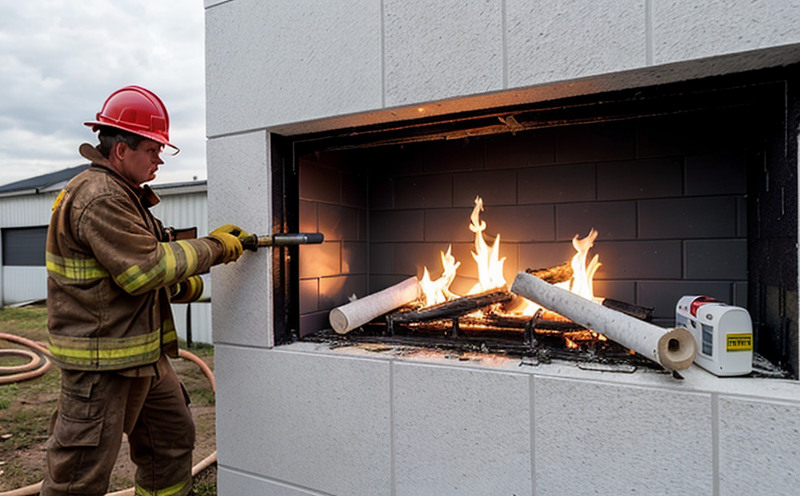Fire Resistance of Masonry Partition Walls
The fire resistance testing of masonry partition walls is a critical aspect of ensuring building safety and compliance with international standards. This test evaluates the ability of a partition wall to resist the spread of fire for a specified period, providing essential data for architects, engineers, and construction professionals.
Masonry partition walls are widely used in commercial buildings, residential structures, and other facilities where fire resistance is paramount. These walls not only contribute to structural integrity but also serve as effective barriers against fire propagation. The testing process involves subjecting a representative sample of the wall to controlled fire conditions in a laboratory setting.
The primary goal of this test is to determine the time it takes for the wall to lose its structural integrity, whether through collapse or compromise of its insulation properties. This information is crucial for designers and builders to ensure that their projects meet safety standards set by regulatory bodies like the International Code Council (ICC) and the National Fire Protection Association (NFPA).
The test setup typically includes a furnace where the wall sample is subjected to increasing heat until it fails. The furnace operates under controlled conditions, ensuring consistent results across different tests. Monitoring parameters such as temperature, flame spread, and structural integrity provide valuable insights into the performance of the material.
For accurate testing, specimens are prepared according to industry guidelines. This includes ensuring that the wall sample is representative of the type intended for use in construction projects. The test setup must also comply with relevant standards such as ASTM E119 and EN 1363-3, which provide detailed specifications on furnace conditions, specimen preparation, and performance criteria.
The results from these tests are critical for decision-makers within organizations responsible for compliance and safety. They help in selecting appropriate materials that can withstand fire exposure without compromising the overall structure's integrity. This information is particularly valuable during design phases when architects and engineers are making decisions about material selection.
Understanding the specifics of this test allows stakeholders to make informed choices regarding the use of masonry partition walls. By adhering to these standards, builders can ensure that their projects meet not only local regulations but also international best practices in fire safety.
Benefits
- Ensures compliance with building codes and regulations
- Provides data for design and specification of fire-resistant materials
- Reduces risk of structural failure during a fire event
- Enhances overall safety in buildings by preventing rapid spread of fire
The benefits of conducting fire resistance tests on masonry partition walls extend beyond mere compliance. By ensuring that the materials used meet stringent standards, architects and builders can enhance the safety of structures, thereby protecting occupants from potential harm during emergencies.
Why Choose This Test
- Provides critical data on material performance in fire scenarios
- Ensures regulatory compliance and code adherence
- Facilitates informed decision-making for architects and engineers
- Promotes the use of high-quality, reliable materials
Selecting this test is essential because it offers a comprehensive evaluation of masonry partition walls under controlled fire conditions. This approach ensures that the chosen materials will perform reliably in real-world situations, offering peace of mind to all involved parties.
Customer Impact and Satisfaction
- Enhanced safety for building occupants during emergencies
- Increased confidence in material performance
- Improved reputation of the organization through compliance with standards
The implementation of fire resistance tests on masonry partition walls directly impacts customer satisfaction by addressing one of their primary concerns: safety. By providing robust and reliable materials, organizations demonstrate their commitment to quality and excellence, which in turn fosters long-term relationships with clients.





